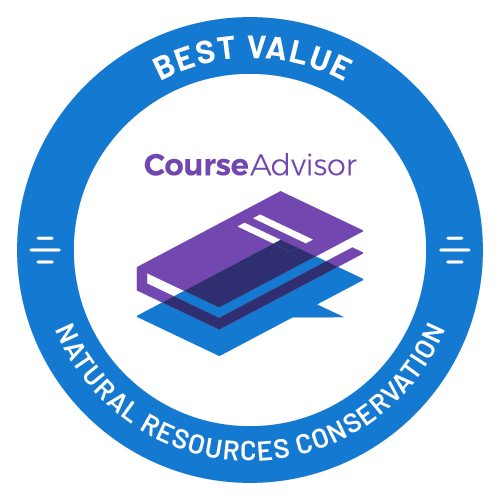2023 Best Value Natural Resources Conservation Associate Degree Schools in the Great Lakes Region
Highlighting Quality Schools With More Affordable Pricing
Finding the Best Natural Resources Conservation Associate Degree School for You
Out of all the majors we analyze each year, natural resources conservation was ranked #49 in the country. In fact 22,254 degrees and certificates were handed out in 2020-2021.
Today's students have lots of options to pick from when considering higher education opportunities. Along with traditional schools that require in-person attendence, you can attend one of many reputable online schools. Some programs even offer a hybrid experience. Alternatively, you may choose a trade school that prepares you to enter the workforce with knowledge in a specific field.
To help you arm yourself with the information you need to make your decision, Course Advisor has developed this Best Value Natural Resources Conservation Associate Degree Schools in the Great Lakes Region ranking. This report analyzed 2 schools in the Great Lakes Region to see which ones offered the best value associate degree programs for conservation students. The goal was to highlight schools with more affordable prices than others offering similar quality experiences.
When determining this ranking, we place a high emphasis on the school's quality as well as its sticker price. Even though a college may be affordable, it may not offer value. Specifically, our score for quality is discounted by the published tuition and fees charged by the given college. This gives the cost per unit of quality for each college. The more quality your dollar buys, the better the value.
Our calculations use out-of-state tuition and fees in our nationwide and regional rankings. For statewide rankings, we use average in-state tuition and fees.
Best Great Lakes Region Schools for Affordable Quality for an Associate in Natural Resources Conservation
Our analysis found Vincennes University to be the best value school for natural resources conservation students who want to pursue a associate degree in the Great Lakes Region . Located in the remote town of Vincennes, Vincennes University is a public school with a large student population.
Vincennes University undergraduate students pay an average of $15,253 in tuition and fees each year.
Full Natural Resources Conservation at Vincennes University Report
Request Information
You’ll join some of the best and brightest minds around you if you attend Lake Superior State University. The school came in at #2 on this year’s Best Value Natural Resources Conservation Associate Degree Schools in the Great Lakes Region list. Lake Superior State University is a small public school located in the town of Sault Ste Marie.
Out-of-state tuition fees for undergraduate students at Lake Superior State University are $13,200 per year.
Request InformationBest Natural Resources Conservation Colleges by State
Explore the best natural resources conservation colleges for a specific state in the Great Lakes region.
| State | Degrees Awarded |
|---|---|
| Michigan | 742 |
| Ohio | 653 |
| Illinois | 488 |
| Indiana | 364 |
| Wisconsin | 564 |
More Natural Resources Conservation Rankings in the Great Lakes Region
Majors Related to Conservation
Natural Resources Conservation is one of 5 different types of programs to choose from.
Majors Similar to Conservation
| Related Major | Annual Graduates |
|---|---|
| Natural Resource Management | 2,933 |
| Wildlife Management | 2,449 |
| Forestry | 2,233 |
| Fisheries Sciences | 483 |
| Natural Resources Conservation (Other) | 151 |
Notes and References
*These averages are for the top 2 schools only.
- The Integrated Postsecondary Education Data System (IPEDS) from the National Center for Education Statistics (NCES), a branch of the U.S. Department of Education (DOE) serves as the core of the rest of our data about colleges.
- Some other college data, including much of the graduate earnings data, comes from the U.S. Department of Education’s (College Scorecard).
- Credit for the banner image above goes to Lynn Betts.
More about our data sources and methodologies.



